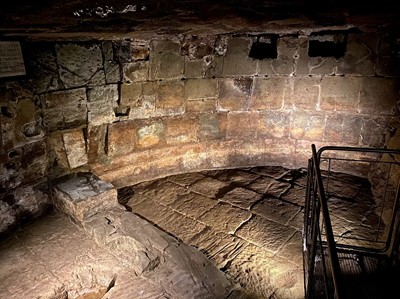
To see the previous installments, click on the following links: #1, #2 , #3, #4, #5, #6, #7, #8, #9, #10, #11, #12, #13, #14, #15, #16, #17, #18, #19
The arrest of Marcus's son was executed with the same coldness with which the inexorable decisions of imperial justice fall upon those who have been found guilty. At the break of dawn, as the first rays of sunlight barely caressed the ancient stones of the city, a group of lictors, escorted by the duoviri, presented themselves at Marcus's house. The atmosphere was solemn, heavy, as if the gods themselves were watching from above, expectant. Until this moment, the young man had been confined to house arrest, a rare indulgence, permitted only by the gravity of the case and the influence of his family.
The home confinement was, for the Romans, an expedient for magistrates to employ in exceptional situations, where the complexities of the case required further reflection before passing sentence. But now, the calm that the Varius family had enjoyed was about to be shattered, for the shadow of the crime committed against a member of the powerful gens Flavia allowed no more leniency.
"By order of the Duoviri!" pronounced the oldest of the lictors, his voice resounding like a hammer on the anvil. The young man, confused and his eyes empty of all reason, was seized by the arms of the men of the law. The mental chaos within him, an echo of madness that in ancient times many would have attributed to the fury of the gods, was not reflected in the absolute silence that surrounded him.
At a steady pace, they led him to the local prison of Pompeii, a place of temporary confinement, before his destination was the Carcer Mamertinus in Rome, also known as the Tullianum, the most infamous of prisons, where only the most prominent criminals or enemies of the state were taken. In the Tullianum, the cells were sunken underground, dank and dark, like an antechamber to the underworld itself. There, to that cold and desolate place, Marcus's son waited to be transferred, no longer as the young man in conflict with himself, but as the one guilty of having spilled the blood of a Flavius.
Meanwhile, Marcus's family stood on the threshold of the house, shattered, not knowing if they would ever see the young man again, for they knew that imperial justice knew no mercy, least of all when the honour of so powerful a gens as the Flavia had been sullied.
The fate of Marcus's son now rested in the hands of Rome. The imperial court would accept no other outcome than one commensurate with the magnitude of the crime. Though deep within me, I knew that the young man was but a victim of fate and of his own broken mind, nothing could alter the course of Roman law.
All that remained was to await the arrival of the men who would take him to Rome, where his life would hang in the judgment of the mighty.
To be continued
Header Image:
Carcer Mamertinus. Source: italia.it
Poor boy, may God bless him!
In my opinion, @yumiyumayume , Marcus's son will not be punished by human justice but by cosmic justice. To be continued...
I see. I'll see it later.
This is turning into a real nail-biter!
I think the story is already having a life of its own and the characters tell me what I have to write because otherwise they get angry, Uly ( @CocoPop ).
I have been to Pompeii three times with my students and, after seeing their reaction to an archaeological site, I thought it would be a good thing to make up a story that could happen in that apparently well-preserved place.
That’s an excellent idea. I had no idea you were a teacher.
AN IRONY: If Pompeii is about to covered with volcanic ash, perhaps the departure to Rome might save his life? (How far is the final eruption?)
The traditional date of the eruption of Vesuvius was 24 August 79 A.D., Tim ( @T-Newfields ). I maintain this date in the story of the 'Murder in Pompeii.' Poor Marcus's son will not get human justice but the “fatum” will. Things happen...